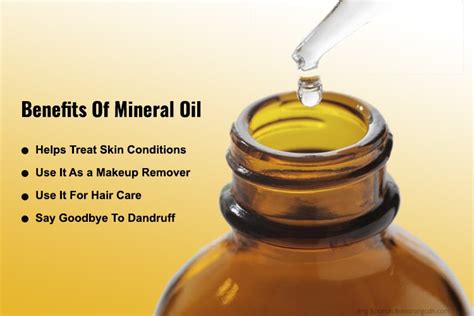Mineral oil is a highly refined, colorless, and odorless oil derived from petroleum. It is commonly used in various industries, including skincare, hair care, and food processing. Due to its emollient properties, mineral oil is often added to hair care products to provide moisture and improve the appearance of hair.

Benefits of Mineral Oil for Hair
- Hydrates Dry Hair: Mineral oil acts as an effective moisturizer for dry and damaged hair. It penetrates the hair shaft and forms a protective layer on the surface, preventing moisture loss and keeping hair hydrated.
- Reduces Frizz: Mineral oil smoothes the hair cuticle, reducing frizz and flyaways. It helps to detangle hair, making it more manageable and less prone to breakage.
- Adds Shine: Mineral oil enhances the shine of hair by reflecting light off its surface. It gives hair a healthy, glossy appearance without weighing it down.
- Protects Hair from Heat: Mineral oil acts as a heat protectant, shielding hair from damage caused by heat styling tools. It helps to reduce breakage and maintain the health of hair.
- Prevents Split Ends: Mineral oil strengthens the hair shaft and prevents split ends by repairing damage and sealing the hair cuticle. It helps to maintain the integrity of hair, keeping it healthy and strong.
How to Use Mineral Oil for Hair
Mineral oil can be used in various ways to improve the health and appearance of hair. Here are some effective methods:
- Pre-Shampoo Treatment: Apply mineral oil to dry hair before shampooing. Massage it into the hair and scalp, and leave it on for 20-30 minutes. Rinse thoroughly with warm water and shampoo as usual.
- As a Leave-In Conditioner: After washing hair, towel dry it and apply a small amount of mineral oil to the ends of the hair. Avoid applying it to the roots, as this can weigh hair down.
- Deep Conditioning Treatment: Mix equal parts mineral oil and coconut oil. Apply the mixture to wet hair and massage it into the hair shaft. Cover with a shower cap and leave it on for an hour or overnight. Rinse thoroughly with warm water and shampoo as usual.
- Hot Oil Treatment: Heat mineral oil until it is lukewarm. Apply it to dry hair and massage it into the hair shaft. Cover with a shower cap and apply heat using a hair dryer or hot towel. Leave it on for 20-30 minutes and rinse thoroughly with warm water and shampoo as usual.
Safety Considerations
While mineral oil is generally safe for use on hair, it is important to note the following safety considerations:
- Allergic Reactions: Some people may experience allergic reactions to mineral oil. Conduct a patch test on a small area of skin before using it on your hair.
- Avoid Contact with Eyes: Mineral oil should not come into contact with eyes, as it can cause irritation.
- Excessive Use: Overusing mineral oil on hair can lead to a buildup of oil on the scalp, causing the hair to look greasy and limp.
Alternatives to Mineral Oil for Hair
If you prefer to avoid using mineral oil on your hair, there are several natural alternatives available:
- Coconut Oil: Coconut oil is an excellent moisturizer for hair. It is rich in fatty acids that penetrate the hair shaft and provide intense hydration.
- Argan Oil: Argan oil is known for its nourishing properties. It contains vitamins and antioxidants that strengthen hair and improve its elasticity.
- Olive Oil: Olive oil is a rich source of oleic acid, which helps to moisturize and protect hair. It also contains antioxidants that prevent damage.
- Avocado Oil: Avocado oil is rich in vitamins and essential fatty acids. It helps to hydrate and nourish hair, leaving it healthy and soft.
Frequently Asked Questions
- Can mineral oil cause hair loss? No, mineral oil does not cause hair loss. In fact, it can help to strengthen hair and prevent breakage.
- Is mineral oil safe for all hair types? Yes, mineral oil is generally safe for all hair types. However, people with fine or oily hair may want to use it sparingly or look for lighter alternatives.
- Can I use mineral oil every day? No, it is not recommended to use mineral oil on hair every day. Excessive use can lead to a buildup of oil on the scalp and weigh hair down.
- What is the difference between mineral oil and petroleum jelly? Mineral oil is a highly refined petroleum product, while petroleum jelly is a semi-solid mixture of hydrocarbons. Both are derived from petroleum, but mineral oil is considered to be a lighter and less greasy option.
